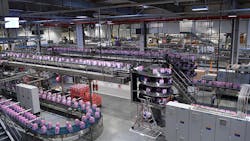Euro Factories Add Jobs in Struggle to Keep Up With Orders
Euro-area factories are scrambling to add staff as burgeoning orders stretch capacity.
A Purchasing Managers Index for the region’s manufacturing industry rose to 58.1 in September from 57.4 the previous month, according to London-based IHS Markit. That compares with a preliminary reading of 58.2 and is the highest level in more than six and a half years. A gauge for employment rose at the fastest pace since the survey began in 1997.
The currency bloc’s economy is on track to expand 2.2% this year, the strongest pace in a decade as global trade, central bank stimulus and political risks all combine to support growth.
“The euro-zone manufacturing boom kicked into an even higher gear in September,” said Chris Williamson, chief economist at IHS Markit. “Surging order-book growth has encouraged manufacturers to take on extra staff at a rate never previously seen in the 20-year history of the PMI survey. Despite this expansion of capacity, backlogs of incomplete work built up at a faster rate, suggesting that the hiring upturn has plenty more room to run.”
Unemployment was 9.1% in August, according to a separate report from Eurostat. Economists had predicted a drop to 9%.
Factory activity expanded in all major European countries, IHS Markit said, led by Germany and the Netherlands. Greece enjoyed its strongest growth since June 2008.
While inflation in the region failed to accelerate in September, European Central Bank policy makers — who will decide in October how to recalibrate asset purchases — can take comfort from the fact that the buoyant expansion is starting to push prices higher.
“The stronger euro has so far barely dented export growth and domestic demand conditions were generally seen to have improved,” Williamson said. “With the upturn being accompanied by rising inflationary pressures, expectations of an imminent announcement from the ECB in relation to tapering of policy stimulus will intensify.”
By Alessandro Speciale
About the Author
Bloomberg
Licensed content from Bloomberg, copyright 2016.
